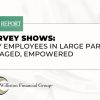
Diane Szoke is the CEO of Relocality.
Describe what you do in one sentence: As a woman, I’m accustomed to balancing the needs of complex social, professional and personal networks on a daily basis — as an entrepreneur, my passion, vision and “intuitive muscle” serve me well in building startups that innovate, disintermediate and disrupt.
Age: 54
Location: Charleston, South Carolina
Social media: LinkedIn, Twitter
What’s your favorite activity outside of work and why?
I have a passion for 20th-century furnishings and decor and have been an avid collector for more than 20 years. I love hitting the road and discovering the next treasure.
What’s your favorite classic piece of literature and why?
I could read Austen and Dickens all day long, but if I had to narrow it down to just one, I’d have to say “Pride and Prejudice” by Jane Austen. It contains one of my favorite literary characters, Elizabeth Bennet, who remains principled and unshaken by what the world thinks she should do and instead is guided by her own sense of what is right. Plus, she ends up marrying the transcendent Fitzwilliam Darcy.
Are you the first entrepreneur in your family?
No, both my parents provided very powerful examples of how far an entrepreneurial spirit can take you. My father started off as Marcus Lowe’s office boy, eventually becoming president of MGM International, and my mother co-founded Counterpart International (a nonprofit organization), which is now a thriving global network offering sustainable, long-term development in over 65 nations — way to go, Mom!
How’d you come up with the idea for your startup?
I’ve been a residential Realtor for nine years and have spent thousands of hours playing tour guide to new movers, and the one thing they all have in common is their desire to fit in.
They want to know — “What are the people who live here like?” “Will my kids fit in?” Will my family feel safe?” “Will I be able to make meaningful social connections with the people around me?”
But as a Realtor, my hands are tied by federal laws that don’t allow me to talk about crime, school performance or diversity, and even if I could, there is just no way I could possibly know about each and every neighborhood and what it’s like to live there. And consumers become frustrated at the lack of information available and many times resort to knocking on doors asking residents what it’s really like to live there.
Turning a pain point into a passion, Relocality was born. It’s that virtual knock on the door, going beyond the four walls of a home to help consumers find a neighborhood that can support the quality of life they are looking for.
Describe a time when you felt particularly insecure about the future of your company. How did you bounce back?
I think most entrepreneurs experience self-doubt, anxiety and fear in the course of pursuing their dreams. I can go from being incredibly excited to incredibly worried most days and weeks. Being an entrepreneur can be isolating, and you may have to go at it alone at times. What should keep you going during low moments (there will be many) is your unshakeable belief that you are solving a problem that you believe should be solved. That passion will carry you far in your conversations with investors, future employees, customers and the press.
What would you describe as your company’s biggest victory since launching and why?
Several amazing opportunities sprang from our New Kids on the Block appearance at Real Estate Connect New York 2014. This propelled our expansion not only geographically but also into new products and distribution partners. In the startup world, the cumulative effect of small victories lead to a few big ones, so it’s also important to value and recognize your team for even the smallest of victories.
What’s been the biggest obstacle your business has encountered, and how have you dealt with it?
In a startup, it’s critical that you hire top-notch performers for every key role, and an exception shouldn’t be made for the founders. So if the founder is not a rock-star coder — or designer, or marketer — she should find people who are and focus on the areas that she can add the most value to the business.
What puzzles you most about the industry?
It’s frustrating that an industry sector that’s so important to the economic well-being of the country repeatedly wastes so much of people’s energy, time and money.
There’s an opportunity for technology to close the inefficiency gaps.
What is the most important lesson you’ve learned about building a business since launching your company?
I hate losing. I really hate losing. But you need to embrace losing if you want to learn. Channel your negative energy. Revisit why you lost. Ask for real and honest feedback. Don’t be defensive about it — try to really understand it. But also look beyond it to the hidden reasons you lost. Truth is, it’s not the end of the world.
What’s the most overrated real estate technology?
If I’m being honest, I’m not a big fan of the plethora of Web marketing systems out there for real estate professionals making all kinds of claims about search engine optimization, leads and ad management. On the other hand, I am very interested in any technology that boldly attacks the status quo and hopes to improve some part of the deeply flawed, frustrating experience of finding a home. Unfortunately, the startups that have attracted the lion’s share of venture capital dollars are those working within the industry, not from without.
How will the role of the real estate agent change over the next five years?
To the outside world, the real estate industry looks old, complacent and easy. Unfortunately, the industry on the whole has done very little to dispel any of those beliefs. Sure, we’ve transitioned from MLS books to digital versions, moved advertising from print and fridge magnets to online, and replaced key rings with lockboxes — but let’s face it, it never really changed, ever. There is a generational shift in expectations, and as a result, the role of the agent continues to diminish in the eyes of the consumer. In many cases, the value they add is not apparent, and they’re viewed as an expensive door-opening service. This environment has made them especially vulnerable to information-driven disruption.
This isn’t to say that real estate agents aren’t needed. I still think knowledgeable and professional agents offer a wealth of value, especially during the negotiation process. Smart real estate agents will embrace new technology advances and use them to survive, while others will continue to waste their time lamenting that the old ways are better because that’s the way that things have always been done.
What motivates you more: power or money?
Oh, definitely power.
What is your biggest professional fear?
Women are notorious for trying to do everything themselves, and I’m no exception. As a female entrepreneur, you’re already taking on the world. However, you can’t do everything yourself. To know when and in what areas you need support and to ask for help are critical to success, and a common pitfall for superwomen!
What is your biggest personal fear?
Heights.
Whom do you respect most in the industry?
Sherry Chris, CEO of Better Homes and Gardens Real Estate. Icon, trailblazer, and I have my eye on her fabulous pink chair.
Are you a business founder who’d like to participate in our Follow the Leaders profile series? Email contributors@inman.com.
The post Diane Szoke: ‘You need to embrace losing if you want to learn’ appeared first on WFG National Title Insurance Company.







